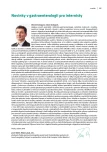-
Medical journals
- Career
Prokinetics and their use in gastroenterology
Authors: Jiří Dolina 1; Aleš Hep 1; Lumír Kunovský 1,2; Štefan Konečný 1
Authors‘ workplace: Interní gastroenterologická klinika LF MU a FN Brno, pracoviště Bohunice 1; Chirurgická klinika LF MU a FN Brno, pracoviště Bohunice 2
Published in: Vnitř Lék 2018; 64(6): 673-678
Category: Reviews
Overview
Gastrointestinal motility disorders are reflected in clinical medicine not only in the form of functional disorders but also as primary organic units or secondary manifestations of other diseases and physicochemical effects. Recent sophisticated diagnostic methods and basic research in the field of digestive tract motility have shown significant development. However, causal treatment of prokinetic motility disorders is still marginalized. A number of new effective drugs have been withdrawn from the market due to their significant side effects. The efficacy of others is limited to individual parts of the gastrointestinal tract (GIT), e.g. only the stomach or the intestine. The article presents an overview of prokinetic indications with an effect on selected pathological conditions. In addition to isolated administering of prokinetics, they can also be used in combination with other drugs, for example in the treatment of gastroesophageal reflux disease with proton pump inhibitors. There is currently no “gold standard” prokinetic, which would globally therapeutically and, at the same time, causally affect such a complicated pathophysiological chain of GIT dysmotility. There is ongoing research to develop new drugs with a beneficial effect on the propulsion activity disorder which, while maintaining a prokinetic effect over the full length of the GIT, would not show any adverse or side effects. Patient access in this case needs to be individualized according to the proven type of motility disorder.
Key words:
gastroesophageal reflux disease – gastrointestinal dysmotility – gastroparesis – intestinal pseudo-obstruction – obstipation
Sources
- Wingate D, Hongo M, Kellow J et al. Disorders of GIT motility: Towards a new classification. J Gastroenterol Hepatol 2002; 17(Suppl): S1-S14.
- Sanjeevi A. Gastric motility. Curr Opin Gastroen 2007; 23(6): 625–630. Dostupné z DOI: <http://dx.doi.org/10.1097/MOG.0b013e3282f0957c>.
- Juřica J, Kroupa R. Farmakoterapie dráždivého tračníku. Prakt lékáren 2017; 13(2): 52–59.
- Lacy BE, Mearin F, Chang L et al. Bowel Disorders. Gastroenterology 2016; 150 : 1393–1407.
- Mařatka Z et al. Gastroenterologie. Karolinum: Praha 1999. ISBN 80–7184–561–2.
- Catnach SM, Faurclough PD. Erytromycin and the gut. Gut 1992; 33(3): 397–401.
- Pehlivanov N, Sarosiek I, Whitman R et al. Effect of cisapride on nocturnal transient lower oesophageal sphincter relaxations and nocturnal gastro-oesophageal reflux in patients with oesophagitis: a double-blind, placebo - controlled study. Aliment Pharmacol Ther 2002; 16(4): 743–747.
- Elskjaer N, Vestergaard ET, Hellstrom PM et al. Ghrelin receptor agonist (TZP -101) accelerates gastric emptying in adults with diabetes and symptomatic gastroparesis. Aliment Pharmacol Ther 2009; 29(11): 1179–1187. Dostupné z DOI: <http://dx.doi.org/10.1111/j.1365–2036.2009.03986.x>.
- Lembo A, Camilleri M, McCallum RW et al. A phase 2, randomised, double blind, placebo-controlled study to evaluate the safety and efficacy of RM-131 in patients with diabetic gastroparesis. Gastroenterology 2014; 146(5 Suppl 1): S158-S159. Dostupné z DOI: <https://doi.org/10.1016/S0016–5085(14)60565–5>.
- Vaezi MF, Pandolfino JE, Vela MF et al. White Paper AGA: Optimal Strategies to Define and Diagnose Gastroesophageal Reflux Disease. Clin Gastro Hepatol 2017; 15(8): 1162–1172. Dostupné z DOI: <http://dx.doi.org/10.1016/j.cgh.2017.03.021>.
- Kahrilas PJ, Shaheen NJ, Vaezi MF. American Gastroenterological Association Medical Position Statement on the Management of Gastresophageal Reflux Disease. Gastroenterology 2008; 135(4): 1383–1391, 1391.e1–5. Dostupné z DOI: <http://dx.doi.org/10.1053/j.gastro.2008.08.045>.
- Pasricha PJ, Camilleri M, Hasler WL et al. White paper AGA: Gastroparesis: Clinical and Regulatory Insights for Clinical Trials. Clin Gastroenterol Hepatol 2017; 15(8): 1184–1190. Dostupné z DOI: <http://dx.doi.org/10.1016/j.cgh.2017.04.011>.
- Weinberg DS, Smalley W, Heidelbaugh JJ et al. American Gastroenterological Association Institute Guideline on the pharmacological management of irritable bowel syndrome. Gastroenterology 2014 : 147(5): 1146–1148. Dostupné z DOI: <http://dx.doi.org/10.1053/j.gastro.2014.09.001>. Erratum in Gastroenterology 2015; 148(2): 455.
Labels
Diabetology Endocrinology Internal medicine
Article was published inInternal Medicine

2018 Issue 6-
All articles in this issue
- Current trends in the diagnosis and treatment of gastroesophageal reflux disease
- Therapy for peptic ulcer disease
- History of celiac disease
- Celiac disease in 2018
- Diagnosis of gastrointestinal motility disorders
- Diverticular disease: diagnosis and treatment
- Familial adenomatous polyposis: complex patient management
- Conventional and biological therapy for inflammatory bowel disease
- The IBD outpatient care in the clinical practice
- PSC-IBD: specific phenotype of inflammatory bowel disease associated with primary sclerosing cholangitis
- Possibilities of therapeutic manipulation of the gut microbiota
- Prokinetics and their use in gastroenterology
- Colorectal cancer screening
- Therapeutic digestive endoscopy I
- Therapeutic digestive endoscopy II
- Internal Medicine
- Journal archive
- Current issue
- Online only
- About the journal
Most read in this issue- Prokinetics and their use in gastroenterology
- Diverticular disease: diagnosis and treatment
- Diagnosis of gastrointestinal motility disorders
- Current trends in the diagnosis and treatment of gastroesophageal reflux disease
Login#ADS_BOTTOM_SCRIPTS#Forgotten passwordEnter the email address that you registered with. We will send you instructions on how to set a new password.
- Career

